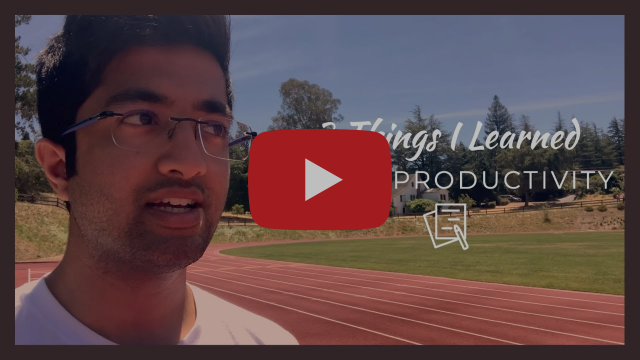How To Optimize Your Life
Hey everybody,
A friend and I recently had an engaging DMZC (Deep Meaningful Zoom Conversation) and he asked me, "What are you optimizing your life for?" I said nonchalantly, "I don't know." Now, initially, my answer would have bothered me, but what was surprising this time was that, for the first time, this question did not. Yes, I still don't know the answer to Derek Sivers's age-old question, but I'm not worried.
There are a ton of things I'm doing at the moment, but at the same time, I'm equally confident to say that I'm not the "best" at any. And that's simply because I don't know what to optimize life for -- happiness, meaning, wealth, passion, profession, friends, family, lifestyle? I don't know.
For some, quarantine can be a time when you're supposed to findthat one thing which you were made for. But I feel it's okay if you don't know that "one" thing, simply because there need not be a single thing you should optimize life for.
Last week, I came across this TED Talk on being a "Multipotentialite" (one who has many interests and creative pursuits), and it got me thinking about two questions:
1) If I see myself as "great" 10 or 20 years down the line, what, precisely, is greatness?
2) Does being a multipotentialite take away from that precise definition of greatness?
20 years down the line, you can be "great" at whatever, carpentry, plumbing, or even gardening -- the field doesn't matter. What matters is that you took a deliberate decision and that your state (2o years down the line) matches with your expectation. Notice I'm not saying that "greatness" is equivalent to being the Mozart of carpentry or Da Vinci of plumbing. I'm saying that you are "great," and it's entirely up to you to define what being "great" means.
I'll let Derek Sivers do the rest of the explaining. As you read ahead, I urge you to keep the above two questions in mind:
"So for example, here’s some options. If you’re really into making lots of money, you need to admit that. Or if you really like prestige or fame or you want to leave a legacy or if you really just like freedom and having no responsibility, you need to admit that. But the point is when you look at this, when you chose the thing that you’re most into that means that you need to optimize for that and be willing to let go of the others and it also means just knowing it so well that you are focused on it and you’re willing to not diffuse your energy in trying to do a little bit of this.
Like, “Well I kind of want to be a little famous and make a little bit of money and leave a little bit of a legacy and get a little bit of freedom.” No, you have to know what matters to you the most. For example, if you really want to make a lot of money, one way to do it is by letting go of these others and just letting other people take the spotlight, for example. So I lived in LA for six or seven years and some of my friends were Hollywood actors that were actually famous and what surprised me is that they’re not rich.
We always assumed that anybody you’ve watched on the big screen has got to be rich, right? But no, a few of them are but most of them aren’t and it blew my mind until I found out that the richest people in Hollywood are the ones you’ve never heard of because they’ve optimized their career for money. They’ve got the huge house on the hill and nobody knows their name. They’re behind the scenes, they let others take the spotlight in return for a little less money, they take no spotlight in return for more money."
So, it could be 1 thing that you're optimizing for, or if you're a multipotentialite, it could be 10 different things -- That doesn't matter. What matters is that you take a deliberate decision, now or later.
Until next time,
Abhinav
The Channel
In this quick, casual video, I talk about 3 cool things I learned about productivity after reading Tiago Forte's book 'Design Your Work.'

Half A Thought
Get the latest episode here.
We begin the next chapter by talking about creativity. They talk about how creativity comes from different spaces, how "Creativity" is a sum of "creativities," why creativity requires actionability, and how Abhi's standardized system of note-taking helps him build an idea maze, not an idea box.
Reference 1: https://www.psychologytoday.com/us/articles/199203/the-art-creativity
Reference 2: https://fortelabs.co/blog/how-to-take-smart-notes/
Our Commonplace Book
This article about ancient complications to modern advice is a great read!